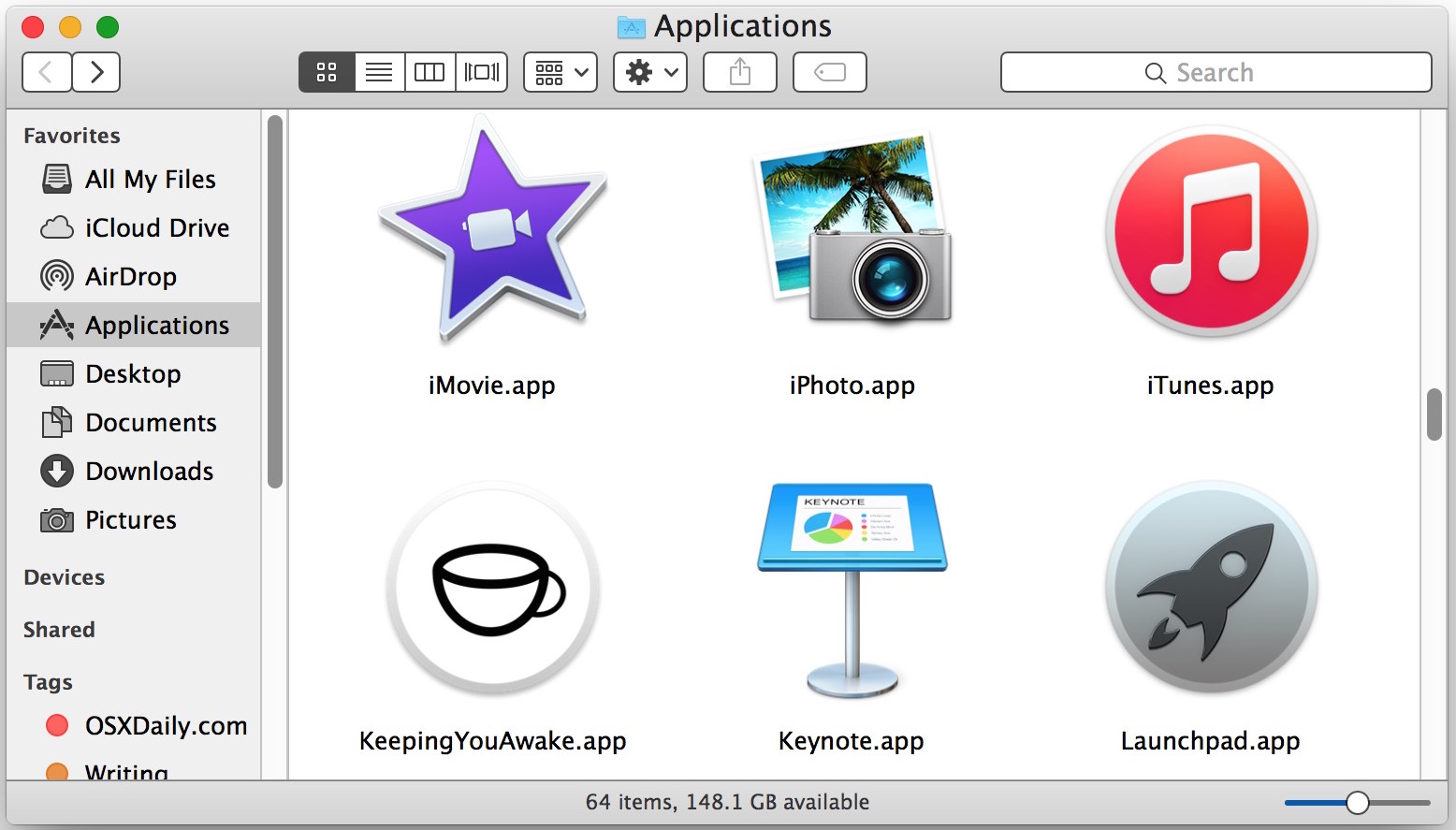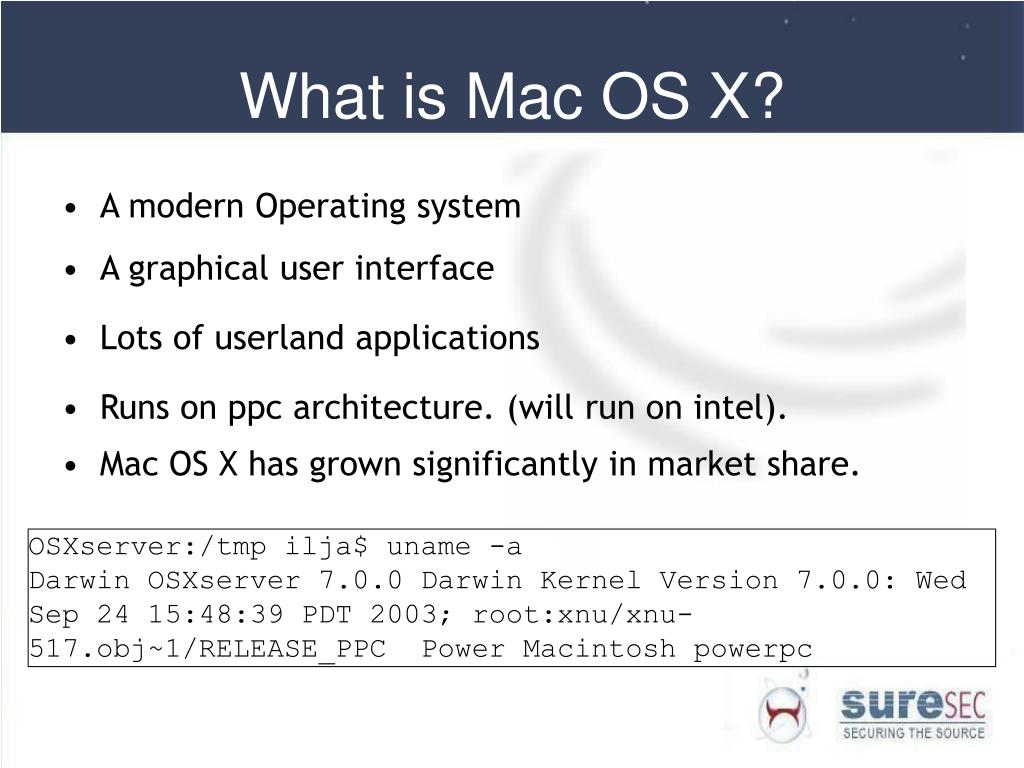GNU Binutils
The GNU Binutils are a collection of binary tools. The main ones are:
I want to get the source code of a small command line tool using objdump on Mac OS X. I've used arm-linux-objdump on Linux and find it a great tool. Is there any way to install objdump on OS X? I've searched Google and found information about arm-apple-dawin9-objdump, but failed to find anything to download. SREC (aka S-Record) format is similar to raw binary - it contains just the byte values but, unlike ELF, no metadata about the CPU or OS used. If you know the CPU used, you can pass it to objdump with the -m switch, e.g. Objdump -m arm -D file.srec. Normally objdump should recognize the format automatically but you can also specify it explicitly with -b srec. Mac OS X¶ PyInstaller runs in Mac OS X 10.7 (Lion) or newer. It can build graphical windowed apps (apps that do not use a terminal window). PyInstaller builds apps that are compatible with the Mac OS X release in which you run it, and following releases. It can build 32-bit binaries in Mac OS X releases that support them. Mac OS X, 32 and 64 bit x86 (Darwin, Intel based). The latter three platforms are all based on the UNIX heritage. I will use 'Unix' as a common name for Linux, BSD and Mac on x86 an x86-64 platforms in this manual. The source code for objconv can be compiled and run under any of these platforms. There isn't a universal way, but you can make an educated guess by looking for things only done by one compiler. GCC is the easiest; it writes a.comment section that contains the GCC version string (the same string you get if you run gcc -version).I don't know if there's a way to display it with readelf, but with objdump it's. Objdump -s -section.comment /path/binary.

- ld - the GNU linker.
- as - the GNU assembler.
But they also include:
- addr2line - Converts addresses into filenames and line numbers.
- ar - A utility for creating, modifying and extracting from archives.
- c++filt - Filter to demangle encoded C++ symbols.
- dlltool - Creates files for building and using DLLs.
- gold - A new, faster, ELF only linker, still in beta test.
- gprof - Displays profiling information.
- nlmconv - Converts object code into an NLM.
- nm - Lists symbols from object files.
- objcopy - Copies and translates object files.
- objdump - Displays information from object files.
- ranlib - Generates an index to the contents of an archive.
- readelf - Displays information from any ELF format object file.
- size - Lists the section sizes of an object or archive file.
- strings - Lists printable strings from files.
- strip - Discards symbols.
- windmc - A Windows compatible message compiler.
- windres - A compiler for Windows resource files.
Most of these programs use BFD, the Binary File Descriptor library, to do low-level manipulation. Many of them also use the opcodes library to assemble and disassemble machine instructions.
The binutils have been ported to most major Unix variants as well as Wintel systems, and their main reason for existence is to give the GNU system (and GNU/Linux) the facility to compile and link programs.
Obtaining binutils
The latest release of GNU binutils is 2.35.1. The various NEWS files (binutils, gas, and ld) have details of what has changed in this release.
See the SOFTWARE page for information on obtaining releases of GNU binutils and other GNU software. The current release can be downloaded from https://ftp.gnu.org/gnu/binutils or, preferably, from a nearby mirror through the generic URL https://ftpmirror.gnu.org/binutils.
If you plan to do active work on GNU binutils, you can access the development source tree by anonymous git:
git clone git://sourceware.org/git/binutils-gdb.git
Alternatively, you can use the gitweb interface, or the source snapshots, available as bzipped tar files via anonymous FTP from ftp://sourceware.org/pub/binutils/snapshots.
Objdump For Mac Os 10.13
Bug reports
There is a bug-tracking system at https://sourceware.org/bugzilla/.
Mailing lists
There are three binutils mailing lists:
- (archives)
- For reporting bugs.
- (archives)
- For discussing binutils issues.
- binutils-cvs (archives)
- A read-only mailing list containing the notes from checkins to the binutils git repository. (This list has an odd name for historical reasons.)
You can use this form to subscribe to the binutils@sourceware.org or binutils-cvs@sourceware.org mailing lists:

To subscribe to the bug-binutils@gnu.org mailing list, see the bug-binutils info page.
You may wish to browse the old mail archives of the gas2 and bfd mailing lists. These were the discussion lists for binutils until May 1999. Please do not send mail to them any longer.
Documentation
Objdump For Mac Os 10.10
The documentation for binutils 2.35.1 is available.

- ld - the GNU linker.
- as - the GNU assembler.
But they also include:
- addr2line - Converts addresses into filenames and line numbers.
- ar - A utility for creating, modifying and extracting from archives.
- c++filt - Filter to demangle encoded C++ symbols.
- dlltool - Creates files for building and using DLLs.
- gold - A new, faster, ELF only linker, still in beta test.
- gprof - Displays profiling information.
- nlmconv - Converts object code into an NLM.
- nm - Lists symbols from object files.
- objcopy - Copies and translates object files.
- objdump - Displays information from object files.
- ranlib - Generates an index to the contents of an archive.
- readelf - Displays information from any ELF format object file.
- size - Lists the section sizes of an object or archive file.
- strings - Lists printable strings from files.
- strip - Discards symbols.
- windmc - A Windows compatible message compiler.
- windres - A compiler for Windows resource files.
Most of these programs use BFD, the Binary File Descriptor library, to do low-level manipulation. Many of them also use the opcodes library to assemble and disassemble machine instructions.
The binutils have been ported to most major Unix variants as well as Wintel systems, and their main reason for existence is to give the GNU system (and GNU/Linux) the facility to compile and link programs.
Obtaining binutils
The latest release of GNU binutils is 2.35.1. The various NEWS files (binutils, gas, and ld) have details of what has changed in this release.
See the SOFTWARE page for information on obtaining releases of GNU binutils and other GNU software. The current release can be downloaded from https://ftp.gnu.org/gnu/binutils or, preferably, from a nearby mirror through the generic URL https://ftpmirror.gnu.org/binutils.
If you plan to do active work on GNU binutils, you can access the development source tree by anonymous git:
git clone git://sourceware.org/git/binutils-gdb.git
Alternatively, you can use the gitweb interface, or the source snapshots, available as bzipped tar files via anonymous FTP from ftp://sourceware.org/pub/binutils/snapshots.
Objdump For Mac Os 10.13
Bug reports
There is a bug-tracking system at https://sourceware.org/bugzilla/.
Mailing lists
There are three binutils mailing lists:
- (archives)
- For reporting bugs.
- (archives)
- For discussing binutils issues.
- binutils-cvs (archives)
- A read-only mailing list containing the notes from checkins to the binutils git repository. (This list has an odd name for historical reasons.)
You can use this form to subscribe to the binutils@sourceware.org or binutils-cvs@sourceware.org mailing lists:
To subscribe to the bug-binutils@gnu.org mailing list, see the bug-binutils info page.
You may wish to browse the old mail archives of the gas2 and bfd mailing lists. These were the discussion lists for binutils until May 1999. Please do not send mail to them any longer.
Documentation
Objdump For Mac Os 10.10
The documentation for binutils 2.35.1 is available.
Objdump For Mac Os Versions
A guide to porting the binutils to a new target has been contributed.
Objdump For Mac Os High Sierra
i'm italian and i need your help.
For to disassemble binary code on ubuntu, you use the command objdump, already implemented on it.
But if i want disassemble with mac binary code?
I tried to install just the famous objdump but I can not.
Surfing the internet, I read that is contained in Binutils, command objdump, and I downloaded from here:
http://ftp.gnu.org/gnu/binutils/?C=M;O=D
binutils-2.20.1.tar.gz 03-Mar-2010 10:21 22M
On wikipedia, it says to do in this way to install it:
Unzip the file, enter the folder and add this code in bash:
./configure --target=avr
make
sudo make install
But it gives me several errors and nothing .. I did not install.
Others say to install Darwin Ports, but do not know how to install it and install it if you really need to have a simple command 'objdump' to need to disassemble.
Can someone help me?
I hope to have some savings to help me, I need to practice in the laboratory of my university, but they all use ubuntu, and my bash I think not it less then other in ubuntu.. It 's absurd if I had to settle with bootcamp UBUNTU.
WE HELP ME PLEASE?
THANKS MAC-GUYS
(sorry for my English, I hope I could express myself well)
